
For a franchise that was once as beloved and successful as Prince of Persia used to be, it’s hard to believe how poorly it’s been managed over the past decade and a half. Nonetheless, there have been some recent glimmers of hope in the form of announcements of new releases, and though many may have had their eye on the upcoming Sands of Time remake as the game that will fully bring Prince of Persia back into the limelight, The Lost Crown has done just that, and done it far better and more effectively than most could have anticipated. Not only does it bring Prince of Persia back to its 2D sidescrolling roots, it also modernizes and reinvigorates that formula in dramatic fashion by adopting a Metroidvania design structure. The end result is one of the best games Ubisoft has put out in years, and a triumphant return to form for this classic franchise.
In Prince of Persia: The Lost Crown, you play as Sargon, making it the series’ first game where you’re not playing as the titular Prince. Sargon is an Immortal, a group of seven elite warriors who’re loyal to Persia and protect it from threats of all kind, both internal and external- and one of those threats rears its head early on in the game when Persia’s heir apparent, Prince Ghassan, is kidnapped by a soldier who was once loyal to the crown, but has apparently betrayed her loyalties for some mysterious, unknown purposes. Dispatched by the Queen to rescue the Prince, Sargon and the Immortals head to Mount Qaf, which serves as The Lost Crown’s setting, and also one of its biggest strengths.
"Not only does The Lost Crown bring Prince of Persia back to its 2D sidescrolling roots, it also modernizes and reinvigorates that formula in dramatic fashion by adopting a Metroidvania design structure. The end result is one of the best games Ubisoft has put out in years, and a triumphant return to form for this classic franchise."
Once the citadel that served as the beating heart of Persia, Mount Qaf now lies desolate and in ruins. Struck many years ago by a tragedy that shattered time, the old citadel is now trapped in a cycle where time moves differently from the rest of the world, and tortured souls who are still trapped there roam endlessly, having lost their minds in their eternal prison. The Lost Crown does an incredible job of building up the mysteries of Mount Qaf- from specific areas being frozen in time to eccentric personalities who speak in vague and ominous terms about the citadel and its past and more, right from the moment the Immortals enter Mount Qaf, they’re met with one tantalizing mystery after another. Combined with hidden nuggets of lore, a surprisingly compelling narrative, fascinating use of Persian mythology, and an incredible sense of place and atmosphere, Prince of Persia: The Lost Crown does a far better job of immersing you in its world and weaving a genuinely intriguing story than I had expected going in.
Of course, it’s no surprise that, in spite of the story and setting’s strengths, what serves as the crème de la crème of the Lost Crown experience is the actual moment-to-moment gameplay. It’s also no surprise that on that front, the platforming stands as one of the package’s highlights- this is Prince of Persia, after all, a franchise that has always been known for its parkour and traversal mechanics. Though it starts off quite simple and straightforward, it doesn’t take long for things to start ramping up. Simple actions like jumping, sliding, wall jumping, swinging off of poles, and dashing are combined to great effect with cleverly (and often deviously) designed platforming challenges requiring varying degrees of precision and timing. There’s something immensely satisfying about making it through a gauntlet where you’re smoothly chaining together moves to deal with crumbling platforms, death traps, blades and saw, pits of spikes, and more.
It helps, of course, that all of that also feels so incredibly true to Prince of Persia as a franchise and the kind of experiences it has traditionally delivered, making this one of several areas where this reinvention as a Metroidvania comes across as an ingenious one. If there’s one criticism I would level at the platforming in The Lost Crown, it’s that the actual movement itself doesn’t feel as quick, smooth, or precise as I’d hoped it would be. Given that this is a Prince of Persia game, I was hoping for moment-to-moment movement that would feel similar to something like Hollow Knight, Ori, or Guacamelee. Instead, there’s a distinct heaviness to The Lost Crown’s movement that makes it feel more akin to, say, Metroid Dread. And yes, it worked for Metroid Dread, and it does work in The Lost Crown as well- it’s just different from what I was expecting.
"There’s something immensely satisfying about making it through a gauntlet where you’re smoothly chaining together moves to deal with crumbling platforms, death traps, blades and saw, pits of spikes, and more."
Then there’s the combat, an area where The Lost Crown is probably the strongest Prince of Persia has ever been. Admittedly, combat has never really been the series’ strong suit, but here, that’s very much not the case. Focusing heavily on parries and dodges, this is another area where the game has some striking similarities to the aforementioned Metroid Dread, and what really makes it tick for me is the incredible variety of enemies you run into over the course of the experience. Enemies come in different shapes and sizes and possessing unique movesets, and properly watching their movements and knowing how to deal with different attacks is a key part of the game.
The Lost Crown can be quite a challenging game, and figuring out the right parry and dodge windows for different attacks can take some mastering, but improving at that part of the experience was something that I was always encouraged to do, because when you do actually get it right and are able to make it through combat encounters that once seemed tough with much more ease, the euphoria and sense of conquering the game feels unparalleled.
Some solid progression systems also ensure that combat retains a certain level of depth throughout the course of the game. For instance, Sargon can equip amulets that serve the same function that Charms do in Hollow Knight, or Spirit Shards do in Ori and the Will of the Wisps. Each comes with unique buffs and benefits, from increasing the power of your aerial attacks to giving you additional health and more, and enough of them are legitimately useful that you feel genuinely motivated to increase the capacity of how many amulets you can have equipped at a time. Meanwhile, Sargon can also spend time crystals (the game’s core currency) to purchase upgrades for himself and his weapons, while you’re also able to unlock and unleash several different special combat moves called Athra Surges over the course of the game. Put together, all of these systems do a great job of getting you even more invested in the game’s combat offerings.
Among all of the game’s strengths though, what really stands out as the unequivocal star of the show is the level design and its Metroidvania structure. The Lost Crown does an incredible job of delivering that trademark constant Metroidvania dopamine drip as you slowly but surely unlock and master a massive, layered, looping, and interconnected world. Exploration is always meaningfully rewarded, either through new abilities, valuable currency, engaging side quests, or hidden lore drops and collectibles.
"The Lost Crown does an incredible job of delivering that trademark constant Metroidvania dopamine drip as you slowly but surely unlock and master a massive, layered, looping, and interconnected world."
That combines with the incredible level design, which never misses a beat in delivering a steady stream of equally well-designed grueling combat challenges, bosses, and mini-bosses, head-scratching and genuinely clever puzzles, and devious, adrenaline-fueled platforming gauntlets. On top of that, Mount Qaf also touts impressive environmental variety- there are over a dozen biomes in the game, and each of them feels distinctly unique in more ways than one. As you explore the citadel, you’ll find yourself in an ancient, abandoned library, which is being stalked by a demented jailer, the dank and dark underground depths of the city, an overgrown forest that’s been taken over by a vicious monster from another dimension, a sunken harbour where time stands still, and more. Not only is each area visually distinct, they all also come with their own unique gameplay hooks, enemies, platforming challenges, and more.
Oh, and speaking of visually distinct, it’s worth shining the spotlight on just how good Prince of Persia: The Lost Crown looks. The game adopts a heavily stylized look rather than going for something more photorealistic, and it works out incredibly well for the type of experience it is. Each location in Mount Qaf is brought to life brilliantly through a combination of incredible art and striking art, while the game also benefits from a heavy dose of flashiness and stylish flourishes, whether that’s with cinematic animations for certain moves and finishers during combat or something as simple as the way enemies move with so much personality. Combined with an incredible soundtrack co-composed by Mentrix and Gareth Coker, The Lost Crown boasts an incredibly strong and distinct identity that’s undoubtedly going to help it stand out in memory long from now.
Something else that deserves special praise is the game’s smart quality-of-life features. Take, for instance, its difficulty settings. I tried out all four of its main difficulty options in my first couple of hours with the game, and nothing really, properly clicked for me until I picked the custom option, which allowed me to much more finely tweak different aspects of the gameplay experience and find a sweet spot that was just right for the way I wanted to play the game. Then there are the Memory Shards might be one of the smartest and most innovative quality-of-life features I’ve seen in a Metroidvania in quite some time. Essentially, these are images that you can take of your surroundings at any time and then pin on your map, so that when you hover your cursor over a Memory Shard on a map, you’re going to see exactly what you were seeing at the time you captured it. It removes a great deal of friction from the sort of backtracking that is commonly associated with the Metroidvania genre.
"Prince of Persia: The Lost Crown is an excellent Metroidvania, and may very well be one of the best games in the series."
Clearly, there’s no shortage of things to love about Prince of Persia: The Lost Crown. A Metroidvania Prince of Persia game wasn’t something I ever knew I needed until not too long ago, but now that I’ve played it, I’m desperate for more. This is a series I’ve been a fan of for as long as I can remember, and similarly, this is a genre that has, over the years, become one of my unabashed favourites- so to see the two coming together in such perfect harmony brings incredible joy to my heart. Prince of Persia: The Lost Crown is an excellent Metroidvania, and may very well be one of the best games in the series.
This game was reviewed on the PlayStation 5.
A surprisingly engaging narrative; Mount Qaf is an incredible setting, boasting stellar level design, consistently rewarding exploration, and impressive variety across its many biomes; Excellent Metroidvania level design and a host of content ensure exploration never gets boring; Incredible platforming; Stylish, flashy, challenging combat; Solid progression and customization mechanics; Looks excellent and runs perfectly; Excellent soundtrack.
Movement doesn't feel as smooth and quick as it should.









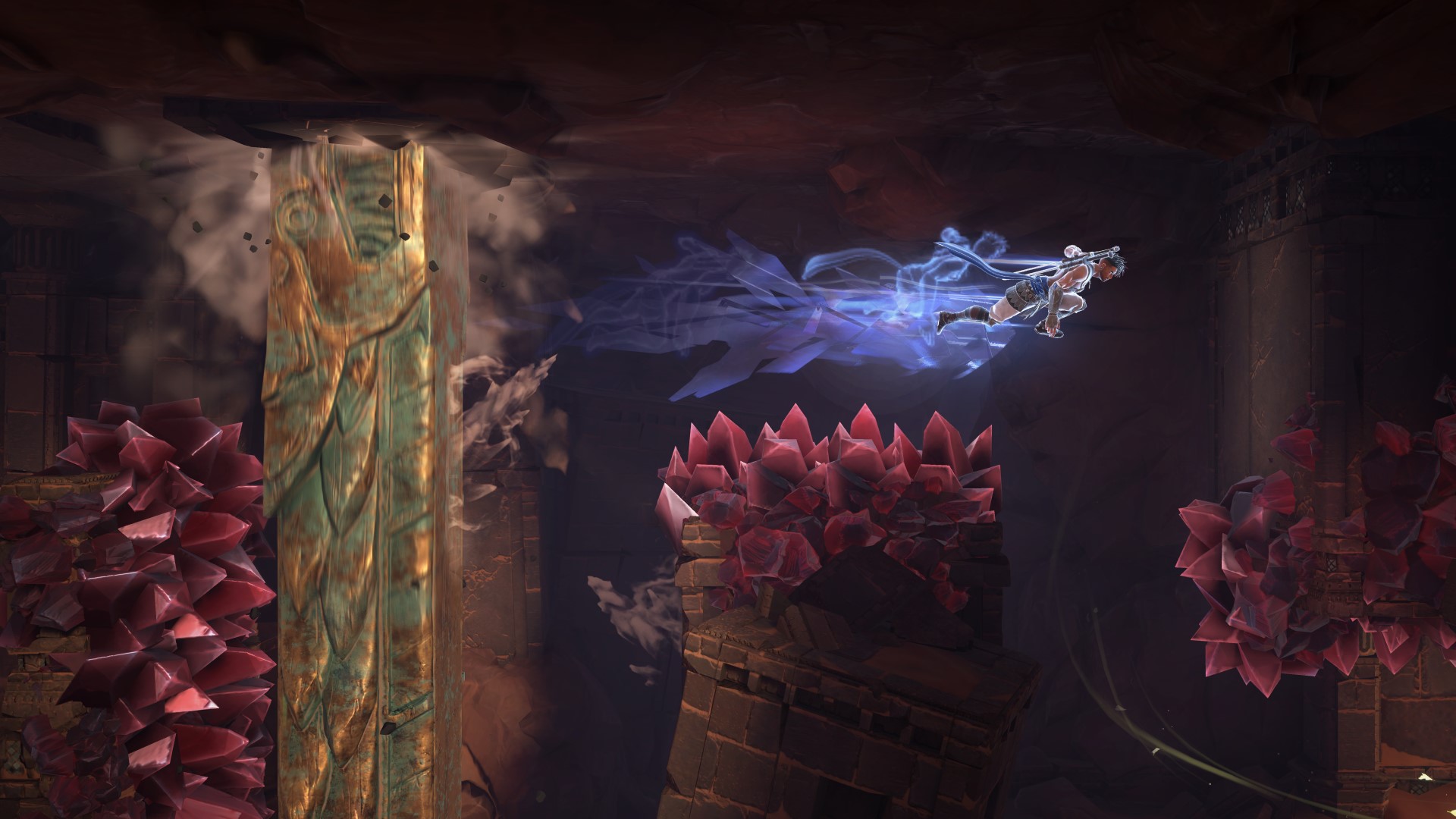
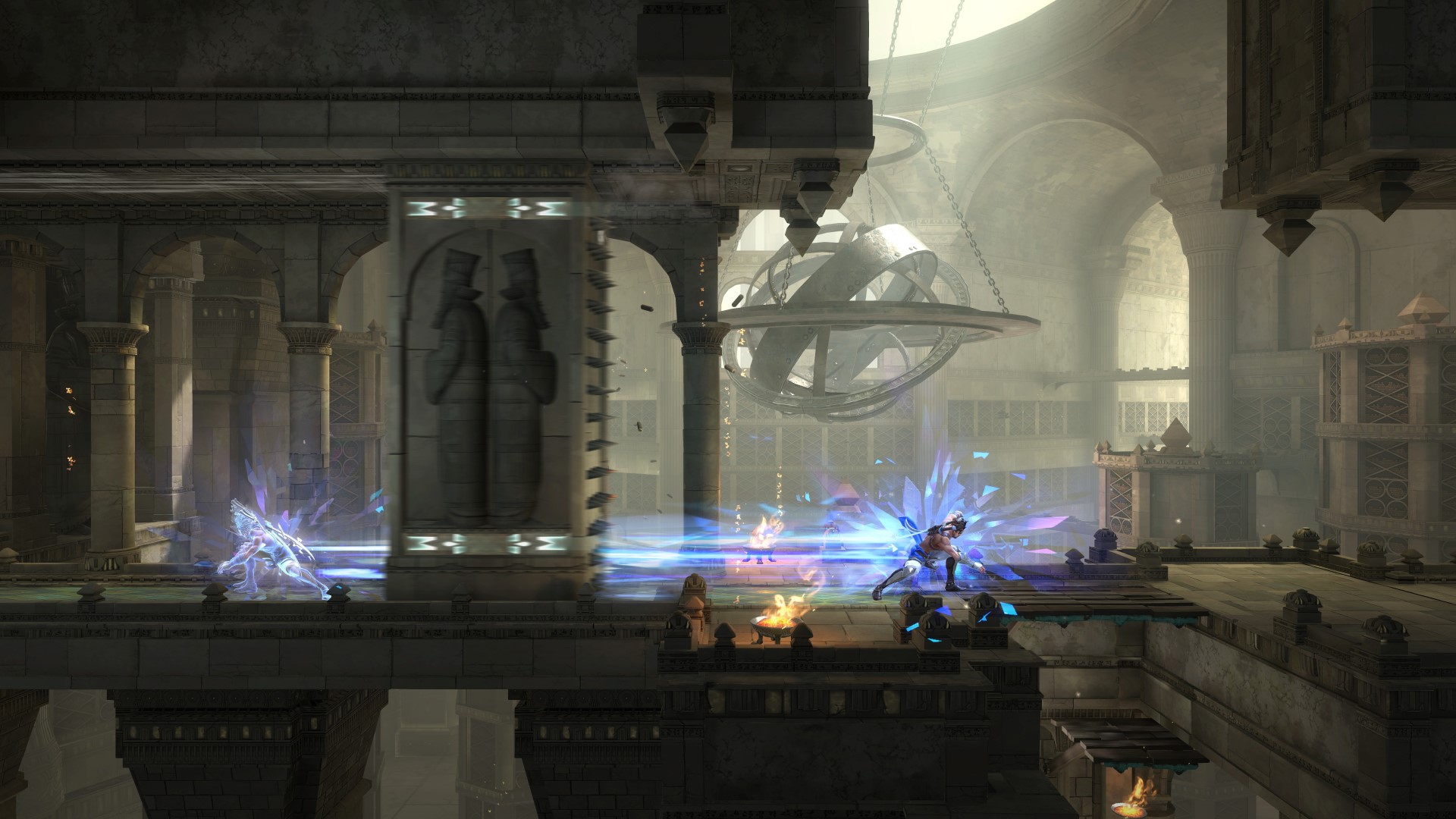
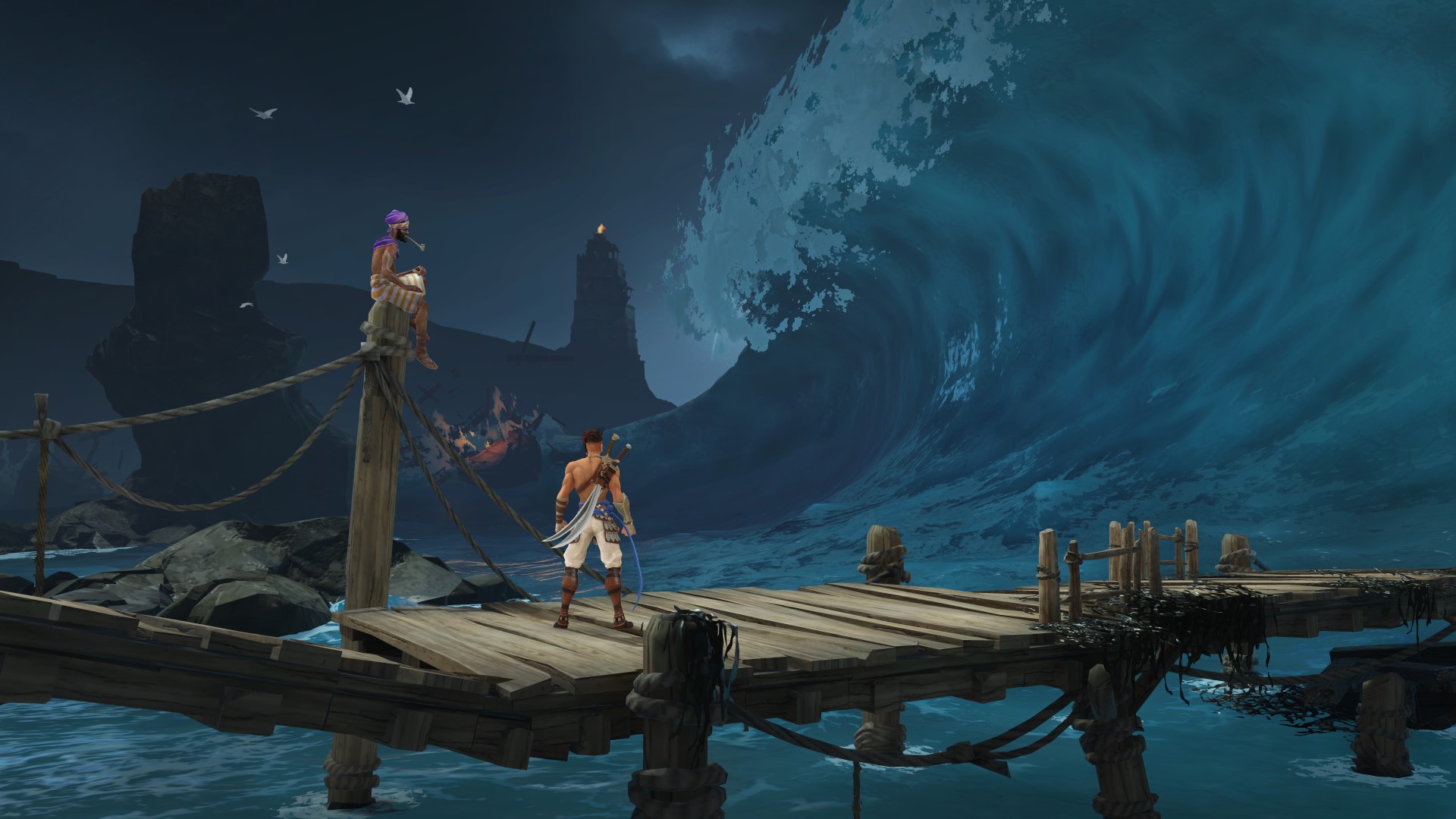

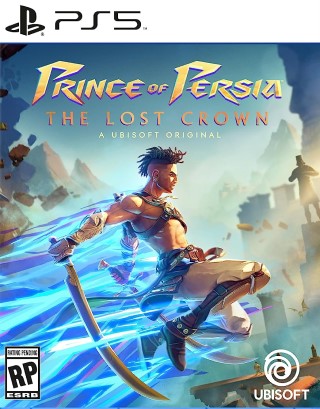

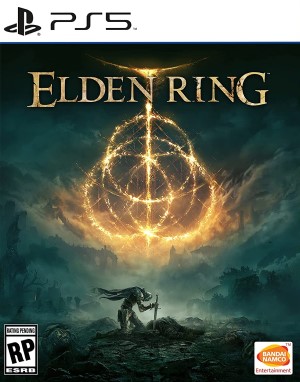
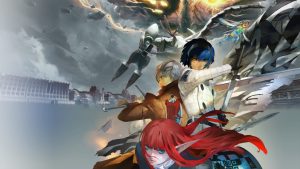
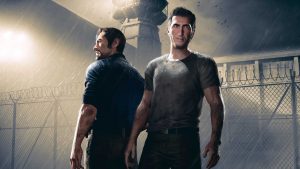

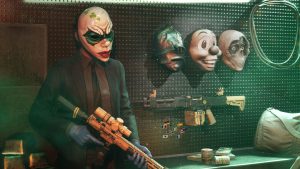
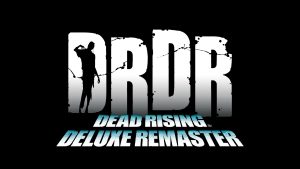
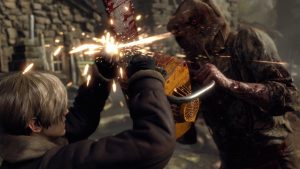
Share Your Thoughts Below (Always follow our comments policy!)